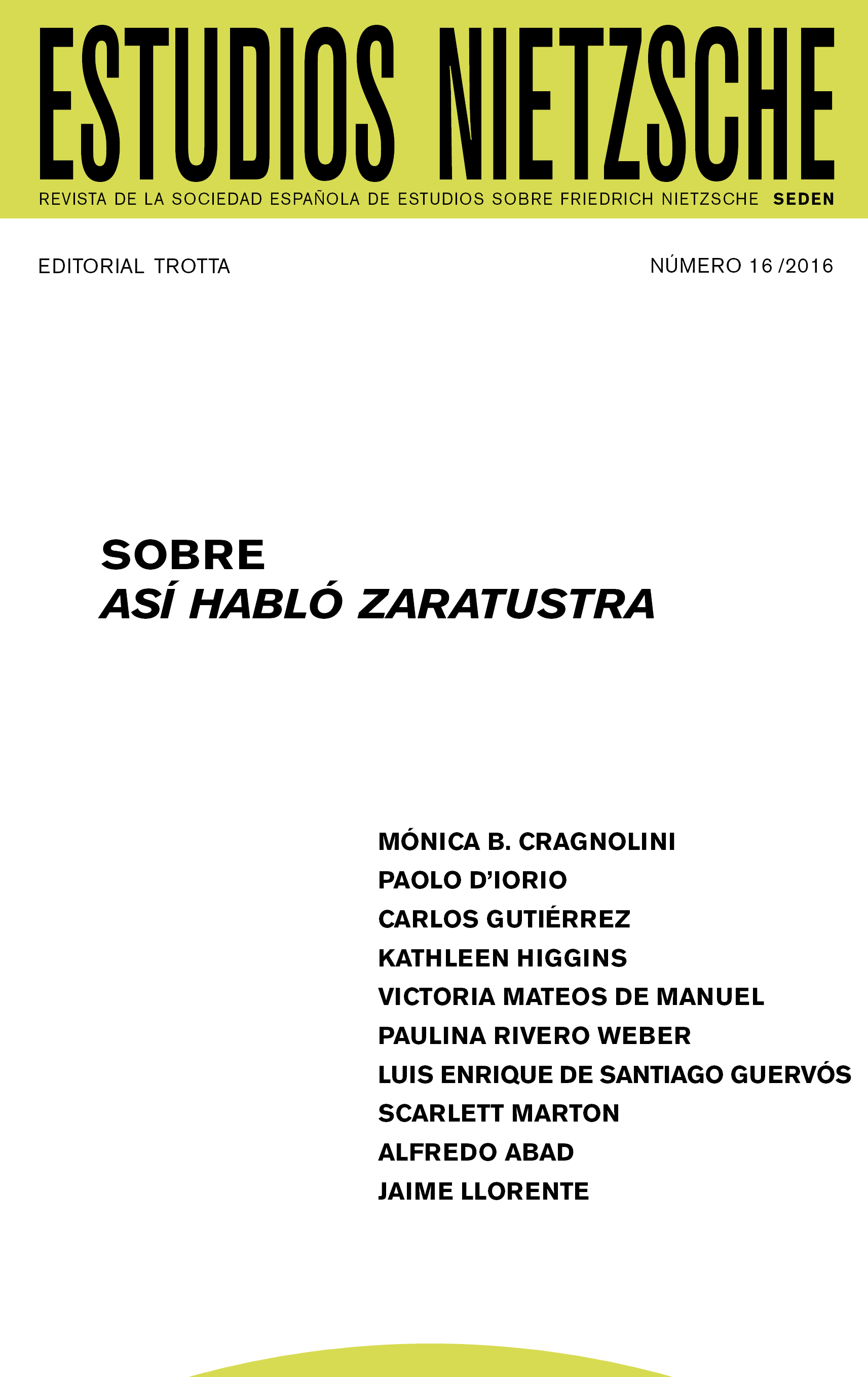That disease in the skin of the earth which is «man»
DOI:
https://doi.org/10.24310/EstudiosNIETen.vi16.10813Keywords:
animality, overman, sacrifice, community of livingAbstract
Thus spoke Zarathustra may be read as an ontological text in which different «ways of being» are present. The mode of «being human», in the figure of «the last man» implies a continuous transformation of the living animal for the sake of «humanization». The culture, understood as «spiritualization», implies to dominate the living animal, to negate it. This «other way of being» which is the Übermensch means other link with the liv-
ing, a non-sacrificial link, analysed in this article.
Downloads
Metrics
References
Agamben, Giorgio, L´aperto. L´uomo e l´animale, Torino: Bollati Boringhieri, 2002.
Cragnolini, Mónica B., «De Bactriana y el Urmi a la montaña y el ocaso. A modo de introducción a Así habló Zaratustra», en Revista de Filosofía, Santiago de Chile: Universidad de Chile, Vol. LV-LVI, 2000, pp. 39-56.
Cragnolini, B., Nietzsche camino y demora, Buenos Aires, EUDEBA, 1998.
Cragnolini, M. B., «Filosofía nietzscheana de la tensión: la re-sistencia del pensar», en Contrastes. Revista Interdisciplinar de Filosofía, Vol. V (2000), España: Universidad de Málaga, pp. 225-240.
Cragnolini. Monica, B., «Tiempo de la salud, tiempo de la enfermedad», en Escritos de Filosofía, Academia Nacional de Ciencias, Buenos Aires, 1999, N? 33-34, pp. 109-119.
Cragnolini, Mónica, B., Moradas nietzscheanas. Del sí mismo, del otro y del entre, Buenos Aires: La cebra, 2006.
Delgado-Ramos, G. C., Biodiversidad, desarrollo sustentable y militarización- Esquemas de saqueo en Mesoamérica, México: Unam-Plaza y Valdés, 2004.
Derrida, J., en Politiques de l’amitié, Paris: Galilée, 1994.
Derrida, Jaques, El animal que luego estoy si(gui)endo, trad. C. de Peretti y C. Rodríguez Marciel, Madrid: Trotta, 1998.
Kafka, Franz, Relatos completos I, trad. N. Mendilaharzu de Machain y J. L. Borges, Buenos Aires: Losada, 1994, pp.131-161.
Macedo, Iracema, «Zaratustra, compaixâo e amor fati», en Rosa Dias-Sabina Vanderlei-Tiago Barros (organizadores), Leituras de Zaratustra, Rio de Janeiro: Maud X-Faperj, 2011, pp. 83-96.
Nietzsche, F., Obras Completas, I-IV (OC ). Director ed. Diego Sánchez Meca. Madrid: Tecnos, 2011-2016
Nietzsche, F., Correspondencia I-VI. (CO). Director ed. Luis E. de Santiago Guervós. Madrid : Trotta, 2005- 2012.
Nietzsche, F., Fragmentos Póstumos I-IV (FP). Director ed. Diego Sánchez Meca. Madrid: Tecnos, 2006-2010.
Vattimo, G., El fin de la modernidad. Nihilismo y hermenéutica en la cultura posmoderna, trad. A. Bixio, Barcelona: Gedisa, 1990.
Vattimo, G., P. A. Rovatti (eds.) El pensamiento débil, trad. L. de Santiago, Madrid: Cátedra, 1988.
Wolfe, Peter, «Image and Meaning in Also sprach Zarathustra», MLN, Vol. 79, No. 5, General Issue (Dec., 1964), pp. 546-552.
Yamin, Farhana, «Biodiversity, Ethics and International Law», en International Affairs (Royal Institute of International Affairs), Vol. 71, No. 3, Ethics, the Environment and the Changing International Order (Jul.1995), pp. 529-546.
Downloads
Published
How to Cite
Issue
Section
License
As of issue 21 (2021) this journal is published only in open access (diamond route).
From that number 21, like the previous numbers published in NIETZSCHE STUDIES, they are subject to the Creative Commons Acknowledgment-NoComercia-ShareIgual 4.0 license, the full text of which can be consulted at <http://creativecommons.org/licenses/by-nc-sa/4.0 >
It is the responsibility of the authors to obtain the necessary permissions of the images that are subject to copyright.
This work is licensed under a Creative Commons Attribution-NonCommercial-ShareAlike 4.0 International License.
Copyright generates two different rights: moral rights and patrimonial rights that EJFB recognizes and respects. Moral rights are those relating to the recognition of the authorship. They are rights of a personal nature that are perpetual, inalienable, unseizable and imprescriptible as consequence of the indivisible union of the author and his/her work.
Patrimonial rights are those that can be derived from the reproduction, distribution, adaptation or communication of the work, among others.







11.png)
